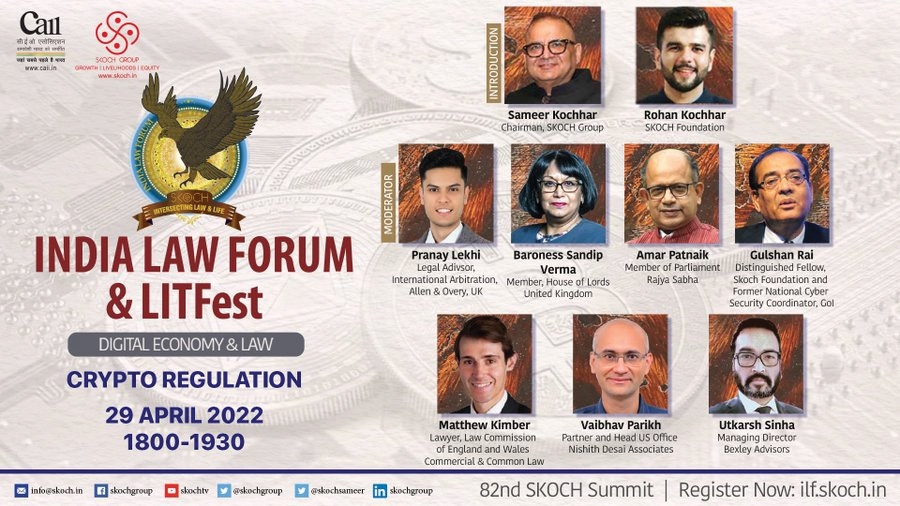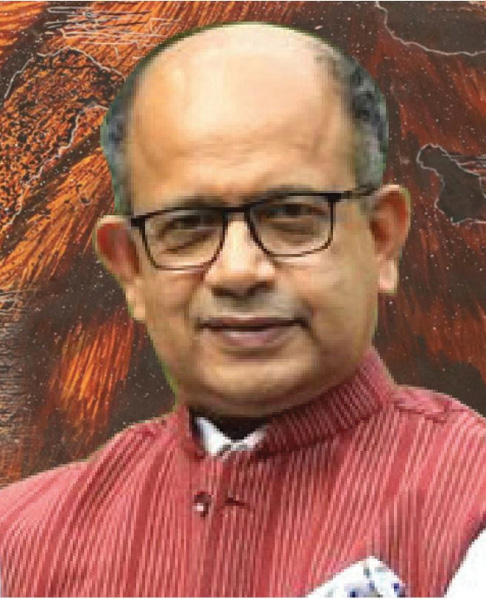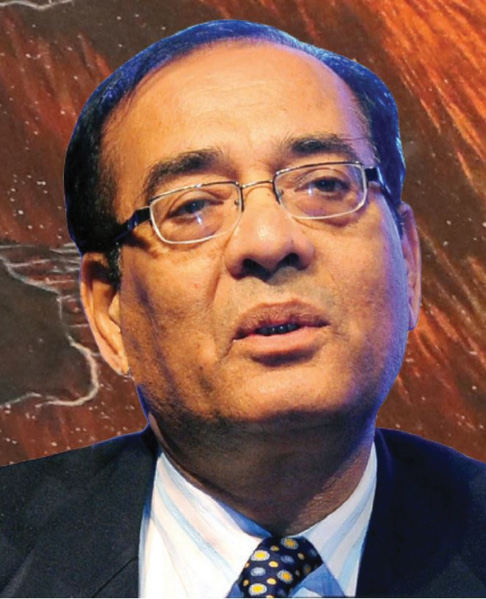
Whatever direction cryptocurrency takes in the future, it simply isn’t going away on its own and needs to be addressed. Regulation seems like a suitable choice but how will it be regulated & what legal implications will it have? Time is running out for India to make a decision on wanting to take global leadership in one of the the fastest growing industry segments, which already has a market-cap of over $2 trillion globally. The Government of India has set a target of achieving $1 trillion digital economy by 2025 and the growth in constituent sectors of the digital economy such as online payments, fintech, social media, cryptocurrencies and gaming has certainly helped in our march towards this impressive goal. However, the regulatory dithering is costing India its position in the race for market leadership in cryptocurrency and it could also result in a loss of opportunity to welcome crypto wealth-creators who are rushing to Singapore, Dubai and London in search for stable policy ecosystems.
The panel will discuss three major issues:
- Should Crypto be banned or accepted?
- How should cryptocurrency be classified and thus regulated?
- Should CBDC and private cryptocurrency co-exist?
MAKE HASTE SLOWLY ON CRYPTO
Hurry to push through the Crypto Bill resulted in hustling by lobbyists and a perception of environment capture; more discussions and convergence of bonafide national and global stakeholders are required

There is a whole gamut of perceived value assets. We may miss out on a legitimate assets class. Outright ban can't be a response to the lack of understanding.

What we don't know is what we don't know. Instead of thinking through (crypto), we may end up over regulating, which may then be difficult to manage.

There is a lack of regulatory capacity. Even if you ban it, there is no capacity to enforce the ban. Far more discussions and global deliberations are required.

A fossilised regulatory approach will not work. More inputs and convergence needed from think tanks; e.g., impact of dollarisation of Crypto.
The widespread adoption of crypto and other digital assets has polarised opinions, with some believing it to be the future of monetary systems and others, who see it as a threat to the financial systems of the country. With the meteoric rise of crypto, more than 20 million investors have joined the bandwagon, primarily from tier 2 and tier 3 towns. While there is no regulatory clarity, the question of investor protection also is looming large. The 2022-23 budget taxed all digital assets at 30%, the punitive measure has left the investors shocked.
Cryptocurrency has found acceptance in countries such as El Salvador and the Central African Republic as legal tender, it was banned outright in China, Qatar and Iran, among others. And yet there are other countries like UAE & Singapore that are looking at regulating cryptocurrency to become the crypto capitals of the world. In India, cryptocurrency has had its ups and downs, which has raised pertinent questions like “should crypto be banned or accepted?” and “how should it be classified and thus regulated?” These were amongst some of the issues about crypto that were discussed threadbare at the India Law Forum organised by SKOCH Group recently.
BACKGROUND
The discourse around cryptocurrency, particularly in India has been clouded by heavy advertising and promises of getting rich quickly. However, there are some fundamental issues linked to this. The first issue is, what are the unintended and harmful consequences of the widespread adoption of crypto. The second is about investor protection, which is mandated by SEBI and followed by all exchanges in India. Additionally, there are doubts about how cryptocurrencies can be used as a tool for illegal activities such as money laundering and tax evasion and perhaps even more serious crimes such as terror financing.
There is no contesting the fact that a large number of investments in cryptocurrency in India have come from people who might not understand the risks associated with it.
The only structured opposition came from think tanks like SKOCH Group, which highlighted the lack of information regarding how the tech worked and the risks that small investors could face.
There was intense and ongoing misinformation peddling by the industry lobbyists who claimed that cryptocurrency was intrinsic to Blockchain and the evolution of the latter was dependent on the proliferation of the former.
This, in addition to the lobbyists claiming influence on policymaking and back channel diplomacy. This resulted in a significant push-back from the government.
The Prime Minister’s Office (PMO) stepped in to caution against cryptocurrency and the RBI raised major concerns regarding such assets, supporting a complete ban of all such private virtual currencies till such time clarity is reached.
The issues around cryptocurrencies have widespread ramifications transcending geographical boundaries. This issue was highlighted by Baroness Sandip Verma, a Member of the House of Lords. She said, “We don’t have clear global recognition treaties or legislation that we’ve signed regarding crypto. I think there’s alot more work to be done around addressing some of the unintended consequences of cryptocurrency and agree upon the fact that there is a need for some regular international agreements around it.”
WHO WILL REGULATE?
The technical nature of crypto in addition to the massive misinformation peddling has led to an inappropriate understanding of what it is. The same entity has been referred to as a currency, a token, a digital asset, a store of value and even data objects. As Mathew Kimber, Lawyer at The Law Commission of England and Wales pointed out, “It exists with or without legislation.” Legislation can limit mining, exchanges and merchant acceptance, but not the crypto itself.
There are also doubts about the capacity of existing regulators such as the RBI and SEBI if they can effectively manage the rapidly evolving nature of cryptocurrencies.
The present approach of the government seems to be to gauge the response to a government-issued CBDC and then take a call on private cryptocurrencies. Amar Patnaik, Member of Parliament, Rajya Sabha said, “I’m certain that the RBI will come with a CBDC because that would actually act as a regulatory sandbox to see how it plays out and then maybe it will get into the issue of private cryptocurrency. Yes, we are short of time because of the rapidly changing situation.” He further said, “One of the biggest constraints is the lack of regulatory capacity.”
Classification of cryptocurrency is important to be able to regulate it as you cannot regulate something you cannot clearly define, classify and understand. The classification can make it clear as to what kind of regulation is possible and which relevant institution would be best suited to regulate it. For example, in India, if it is treated as a currency, it would be regulated by RBI and if it is accepted as a security, then SEBI would be looking into regulations about it. Vaibhav Parikh, Partner, Nishith Desai Associates & Head US Office, strongly advocated for regulating cryptocurrency according to how it is used – “regulate it like it is behaving”.

Crypto exists as a data object, whether we like it or not. Do we really need additional legislation or extending existing one with smarter enforcement is the best course.

If it behaves like a duck, we should regulate like a duck. A single regulator may not be possible. A starting point could be an SRO with sound KYC norms.

Countries need to come together on how to regulate? PM Modi stated that technologies like Crypto can not be decided on by single country options.

Crypto is a point of inflection for money similar to moving to flat currency. Digital currency & bonds exist. Crypto only changes underlying technology.
TOO BIG TO IGNORE
There is a lot of noise interlinking crypto and blockchain but in due course of time blockchain will become a technological component with diverse uses in areas such as smart contracts, banking, insurance, government benefit transfers to citizens, and much more. According to Utkarsh Sinha, Managing Director of Bexley Advisors, “A lot of the blockchain companies that emerge from this clutter on the other side, will be the kind of companies that are fundamentally able to reshape how we do business globally and generate long-term value.”
The discourse around private cryptocurrencies in India has swayed continuously in different directions with calls for legalisation on one side and complete bans on the other. There has to be a balanced and rational approach to deal with these issues. Regardless of a ban, crypto and related assets will continue to exist and a complete ban might only give rise to an alternate black-market, over which the law enforcement agencies and the governments might have no control. Kimber expressed his skepticism about the result of total bans and said, “Crypto-assets would exist, irrespective of any legislation or regulation because of the perceived value that the traders or consumers find in them.”
While banning or acceptance isn’t recommended until proper international consultations are done and common frameworks are devised, Baroness Verma favoured regulating the technology and getting as much information about it as possible through multi-stakeholder dialogues.
Echoing a similar sentiment, Gulshan Rai, Former National Cyber Security Coordinator suggested that more research and information was needed before a decision could be arrived at – “clarity first, action later”. As RBI looks to roll out a legal central bank-regulated digital currency (CBDC) with the government’s support, it can act as a regulatory sandbox for private cryptocurrencies.
RECOMMENDATIONS
- There is a need for transparent multi-stakeholder deliberations/ consultations and deep-dive discussions at a national and international level.
- There has to be greater international cooperation between governments with a more holistic approach.
- Global frameworks, standards, definitions, use cases and classification for cryptocurrencies to be accepted.
- Premature bans and knee-jerk reactions have to be avoided. While there is little benefit in a premature ban of cryptocurrency, the country can miss out on technological benefits, wealth and talent arising from the innovation around cryptocurrency.
- We must build the regulatory capacity to be able to take decisions and successfully enforce them.
- Use CBDC as a regulatory sand box; if it works, private cryptocurrencies can work as well – clarity first, action later.
- A mechanism for investor protection needs to be put in place immediately.
- The experience of knowledge-based think tanks having worked on investor protection to be leveraged.

Sameer Kochhar
Chairman
SKOCH Group

Rohan Kochhar
SKOCH Foundation

Pranay Lekhi
Legal Adivsor, International Arbitration
Allen & Overy, UK

Baroness Sandip Verma
Member
House of Lords, United Kingdom

Amar Patnaik
Member of Parliament
Rajya Sabha

Gulshan Rai
Distinguished Fellow, Skoch Foundation and
Former National Cyber Security Coordinator, GoI

Matthew Kimber
Lawyer, Law Commission of England and
Wales Commercial and Common Law

Vaibhav Parikh
Partner and Head US Office
Nishith Desai Associates

Utkarsh Sinha
Managing Director
Bexley Advisors



